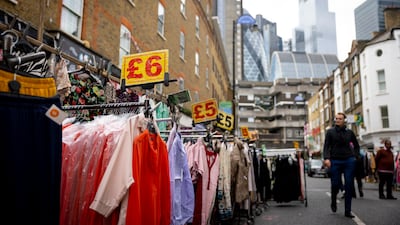The UK economy managed weak growth in April, after having shrunk in the previous month, according to the Office for National Statistics.
British economic output grew by 0.2 per cent, month on month, in April, in line with economists' expectations, the ONS said.
Some of the strength came from improved business at restaurants and hospitality venues, while car sales rebounded in the month.
“These were partially offset by falls in health, which was affected by the junior doctors' strikes, along with falls in computer manufacturing and the often-erratic pharmaceuticals industry,” said Darren Morgan, director of economic statistics at the ONS.
“House builders and estate agents also had a poor month.”
The broader quarterly picture showed that the UK economy grew by 0.1 per cent in the three months to the end of April, the ONS said.
The services sector was the largest contributor to the rise in the overall gross domestic product number, growing by 0.3 per cent in April, after a 0.5 per cent fall in March.
Within the services sector, consumers set the stage for a bounce-back, with output in consumer-facing services growing by 1 per cent in April, after a drop of 0.8 per cent in the previous month.
The construction sector shrank by 0.6 per cent in April, after growing by 0.2 per cent in March.

Taming the inflation beast
Reacting to the GDP figures, Chancellor Jeremy Hunt repeated his plan to cut the rate of inflation in half, which is currently running at 8.7 per cent.
“We are growing the economy, with the IMF [the International Monetary Fund] saying that from 2025 we will grow faster than Germany, France and Italy,” Mr Hunt said.
“But high growth needs low inflation, so we must stick relentlessly to our plan to halve the rate this year to protect family budgets.”
Shadow chancellor Rachel Reeves from the opposition Labour said: “Despite our country's huge potential and promise, today is another day in the dismal low-growth record book of this Conservative government.
“The facts remain that families are feeling worse off, facing a soaring Tory mortgage penalty and we're lagging behind on the global stage.”
While a little impressed with the limited resilience of the UK economy in the GDP numbers, analysts said high inflation and borrowing costs are continuing to hold back growth.
“’With consumer spending holding up, particularly in hospitality, and the impact of strikes more minimal, the UK economy has eked out growth in April, but stubborn inflation is still casting a shadow over the slightly sunnier outlook,” said Susannah Streeter, head of money and markets at Hargreaves Lansdown.
“Although the UK continues to swerve a technical recession and buck earlier forecasts, the situation is fragile.”

Interest rates
With all eyes now turning to the Bank of England's meeting next week, another 0.25 per cent increase in interest rates to 4.75 per cent is now seen as inevitable, especially given the stronger-than-expected labour market numbers released on Tuesday.
The market is pricing in the possibility that rates could reach as high as 6 per cent by early next year.
“The figures will not be read with as much enthusiasm by the Bank of England as they continue to suggest an economy that is so far managing to shrug off the dampening effects of the 4.25 per cent of tightening delivered so far in the current tightening cycle as the Monetary Policy Committee struggles to bring inflation back under control,” said Stuart Cole, chief macro economist at Equiti Capital.
“Taken in conjunction with yesterday’s strong employment figures, the outcome of this month’s MPC meeting now looks to be a certain further increase in interest rates, and as monetary policy is tightened ever further so the chances of the UK avoiding slipping into a recession recede.”
Uncertainty prevails
Business groups said companies would continue to face economic headwinds, despite a certain optimism implicit in Wednesday's GDP figures.
“The combination of high inflation and rising debt service costs will constrain consumer cash-flow and dampen the housing market,” said Ben Jones, lead economist at the Confederation of British Industry.
“Businesses are feeling the pinch from tighter financial conditions and lending to firms has stagnated in recent months, especially to SMEs [small and medium enterprises].
“Although energy and digital transformations remain high on firms’ agendas, uncertainty over the wider economic outlook means businesses investment is likely to remain subdued in the near term.”
However, in terms of interest rates, the bounce-back in consumer-facing services may be a double-edged sword, according to Kitty Ussher, chief economist at the Institute of Directors.
“This suggests that households responded to the improving weather in April by raising their levels of discretionary spending – even in the face of rising costs,” she said.
“Businesses in the consumer-facing sectors will be encouraged by today's data.
“However, the Bank of England may interpret it as proof that their interest rate hikes have not yet dampened demand enough to reduce inflationary pressure, particularly when combined with yesterday's strong labour market performance.”
As higher interest rate expectations loom, analysts said the gloom surrounding the housing market could only deepen.
“Further rate rises will only dampen the housing market, as would-be home movers put their plans on hold and first-time buyers get priced out by affordability checks,” said Alice Haine, personal finance analyst at Bestinvest.
“With mortgage lending already dipping at the start of the year and saving levels in retreat as people raid their savings pots to pay bills and support regular household expenditure, the outlook for the economy remains uncertain.”


